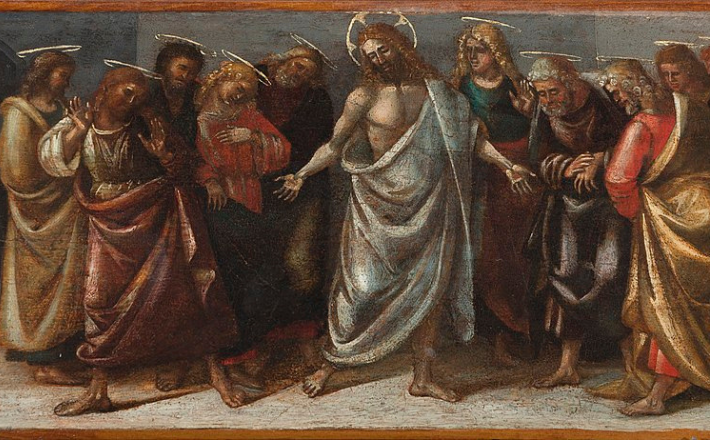Commentary on Acts 4:32-35
For a long time, Americans called the Sunday after Easter “Low Sunday”—a reference to how, the week after Easter, churches were notably low in attendance, low in energy. The season of Lent has come to completion; the mountaintop has been summited, the stone rolled away. What do followers of Jesus do after Easter, after all the preparations and celebrations? Why does Easter Sunday matter every day?
Many Christians are not aware that in the liturgical calendar, Easter Sunday is the kickoff to an entirely new season—the 50 days between Easter and Pentecost known as Eastertide. Catholics and Anglicans traditionally light a white Paschal candle each night of Eastertide to thank God for the resurrection.
Of course, the liturgical calendar had not yet been established at the time of the apostles, but Acts 4:32–35 gives us a glimpse of what some of Jesus’ earliest followers were doing after his resurrection and Pentecost. At this point in the story, the apostles are facing opposition from the Jewish authorities. In Luke’s Gospel, the Pharisees and Sadducees oppose Jesus, but in Acts, the main opponents are the Sadducees (whom the Jewish historian Josephus describes as the aristocratic temple priesthood.1
Peter testifies before the Jerusalem Council (4:1–22), thereby fulfilling Jesus’ promise that he will give them the words they need to defend themselves (Luke 12:11–12). The apostles’ prayers are immediately answered (4:23–31), in a clear echo of Pentecost (see also 2:1–4). The apostles are depicted fulfilling Jesus’ command to testify as his witnesses with “great power” (4:33; see also 1:8), and they voluntarily share possessions (4:33–37), implementing Jesus’ commands from the Gospel (for example, Luke 12:33; 18:22). The phrase “heart and soul” may draw upon Deuteronomy (4:29; 6:5; 10:12; 11:13; 26:16), and/or echo traditional Greek proverbs that extolled generosity and friendship using the same phrase.
This passage and Acts 2:42–47 are most cited as evidence that although contemporary Christians are divided, the earliest followers of Jesus enjoyed an uncomplicated, harmonious koinonia (fellowship: a praised virtue across ancient Jewish and Greek literature).
Many have heralded the community in Acts as a paradigmatic example of Christian love and unanimity. But other passages in Acts indicate that this nostalgic, romanticized image of the earliest Christian community was not the whole picture. For one thing, this idyllic communal portrait does not last: the very next chapter in Acts offers a counter-example in the greed and deception of community members (insiders!) Ananias and Sapphira (5:1–11).
I do not mean to refute the beauty of the community depicted in Acts 2 and 4, nor do I deny the aspirational ideals of generosity, unity, and sharing we find there. I only want to caution against the perception—common among many Christians today—that the earliest Christians were uniform and/or somehow “better” than we are. Like all humans, they were limited in understanding and ability; like all humans in community, their efforts to live and serve together did not always go smoothly. The book of Acts as a whole and, indeed, the entire New Testament attest that the communities of early Jesus-followers disagreed about many things, and that Christian communities were characterized by diversity of many kinds from the start.
This is, in fact, good news, because it connects us to them. Though many aspects of the apostles’ world do not sit well with us (slavery is but one example), we can still relate to the existential and practical challenges that always arise when humans are “human-ing” together.
For instance, this passage can invite us to ask about resource allocation in our community. How do we spend our resources (monetary or otherwise), and why? Does our community tend to agree or disagree about how we give and receive, about who “deserves” to give or receive, and why? How can we handle disagreements when they inevitably arise, without using this passage to shame our community for not being unified?
Verse 34 says there was not one “needy” person among them (the Greek term endeēs only occurs here in the New Testament; etymologically, it comes from en + deo, to be in need of, or lacking). How do we define “needy”? Correct use of possessions is a common Lukan theme, though different passages appear to send different messages.
In the Gospel, Jesus’ concern for the poor is evident in his pronouncement of beatitudes for the poor and woes for the rich (6:20–25), and stern warnings about the perils posed by wealth and possessions (for example, 12:13–21, 16–21; 16.9–15, 19–31). These teachings fit well with Acts 2 and 4, where believers sell all they have in order to provide for others. But we also have the example of the tax collector Zacchaeus, who only gives away half of his wealth to the poor (Luke 19:1–10, especially verse 8).
Which of these biblical examples do Christians today follow, and why? Do those who claim private ownership in our community usually sell everything and give the proceeds to those in need? Obviously, most American churches do not work this way. Capitalism honors individualism and wealth; for many today, the specter of communism lurks behind the references to communal ownership in Acts 2 and Acts 4, raising suspicion and encouraging a speedy jump to more comfortable verses. Americans might teach our children to share, but only within limits. Is this why so many American Christians understand this passage in Acts as metaphorical instead of literal?
Historians agree that most people in the first-century Roman Empire lived at or below subsistence level; their lives required a literal sharing of material resources. Ancient philosophers such as Cicero and Aristotle also praised the virtues of communal ownership in their teachings (even if actual practice was different). Still, most Christians today do not seek to recreate those conditions when talking about emulating the earliest Christians.
All of this raises larger questions about the ethics of biblical interpretation. How and when do we consider historical contexts relevant or irrelevant for our particular contexts, and why? Should we always take narrative descriptions like the one we find in Acts 4:32–35 as instructions for how Christian communities ought to relate to each other today? Why or why not?
Notes
- Antiquities 13.297-98



April 7, 2024